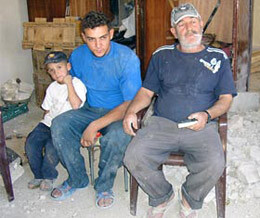United Nations High Commissioner for Refugees 18 October 2006

Mustafa Nasser and his sons sit in what used to be the family’s living room in the southern Lebanese village of Haddatha. His father was killed when Israeli strikes badly damaged the house. (UNHCR/A. Rehrl)
The village centre is unrecognisable, with a mosque, shops and about 100 houses reduced to rubble. Some families have returned to rebuild their homes, but with winter approaching and their rural livelihoods destroyed others of Haddatha’s displaced inhabitants whose homes were ruined are staying away.
UNHCR is helping those determined to stay and, through a partnership with the UN Mine Action Service, has also cleared most of the village of landmines and deadly unexploded ordnance (UXO).
One of the returnees, Mustafa Nasser sits in what is left of his family’s living room. He stayed in the house for 23 days after the July 12 launch of Israeli strikes on Lebanon in retaliation for the abduction of two Israeli soldiers by Hezbollah militiamen.
“My youngest child is 18 months old, I wanted her and all others to be safe. So I went back and forth to the nearby village where we were displaced,” recalled Nasser, a married father of 10 who eventually left when it simply became too dangerous.
But his elderly father, whose family had lived in the house for generations, refused to budge. “My father was very old and very much attached to his home and to his fields,” said Nasser, adding: “I wanted to carry him, but my father said he preferred to die here.” When the family returned to Haddatha after the August 14 ceasefire, they found the old man’s body buried under his collapsed house.
Nasser and his sons have started to rebuild their home. Their aim is to have at least two rooms ready before winter starts. For the time being they live with a host family, but Nasser believes more people should be returning and staying in a village that normally houses 170 families, or about 900 people.
“Everybody from this village has gone to Beirut,” the 50-year-old complained. “What do they want to do there? If Beirut has to absorb tens of thousands of internally displaced people, they will have a major problem soon. They should return here and rebuild their homes,” he insisted.
“During this conflict, I lost my horse, my car, my crops, my income and my home,” Nasser said, adding: “All these things can be replaced.” But most of the local farmers who have lost their homes and their livelihood are less sanguine.
Israeli airstrikes caused wide damage to the area’s olive groves, orchards and fields of tobacco and vegetables. It will take them a long time to recover - up to two years for newly planted tobacco plants to reach maturity. With no means of income, the farmers are hoping for compensation from the government - in the meantime, many prefer to stay in Beirut.
Mustafa also hopes that Haddatha’s school can be repaired soon. For the time being he plans to send his children to study in another village, but he will have to pay for transportation. The school year began last Monday.
Meanwhile, UNHCR teams have finished the distribution of relief items in southern villages and are finalising a mapping exercise on identified damage, needs and assistance provided. The agency, through its local partner Samidoun, has also been warning locals about the continuing danger from mines and UXO.
“The awareness-raising sessions for adults are necessary, because farmers are impatient to go back to their fields,” said Ghina Holmen, UNHCR protection officer in the southern city of Tyre. “People in this area are so used to mines that they don’t care. They even collect UXO themselves, if they find some. We are doing our best to convince them not to touch any suspicious metal,” she added.
Related Links

